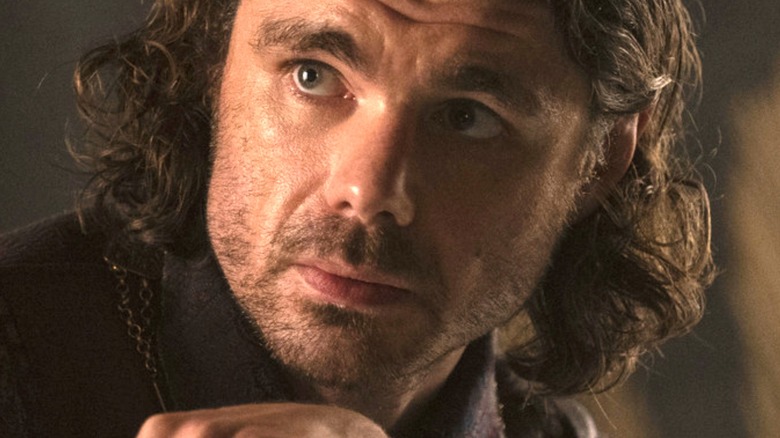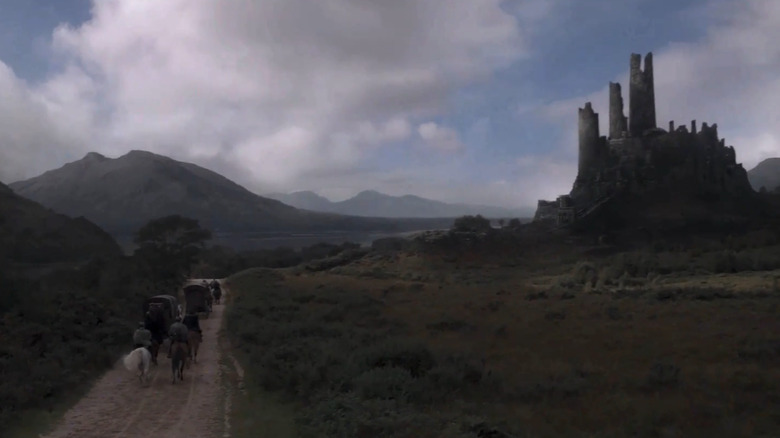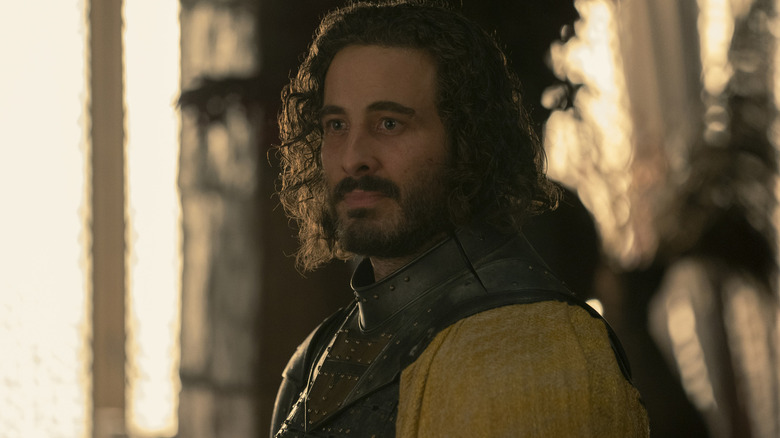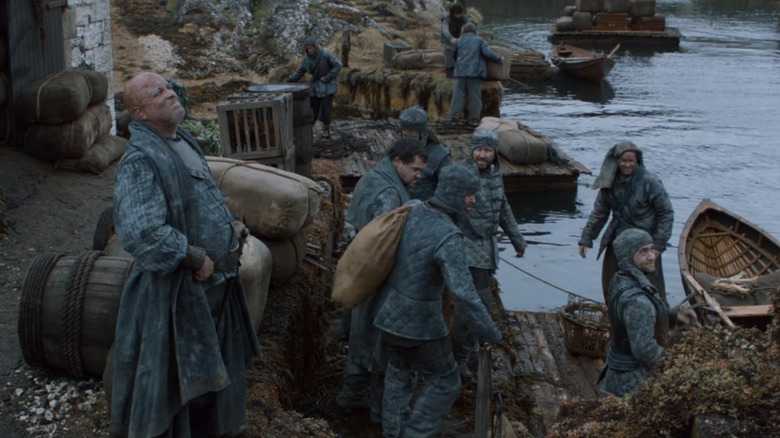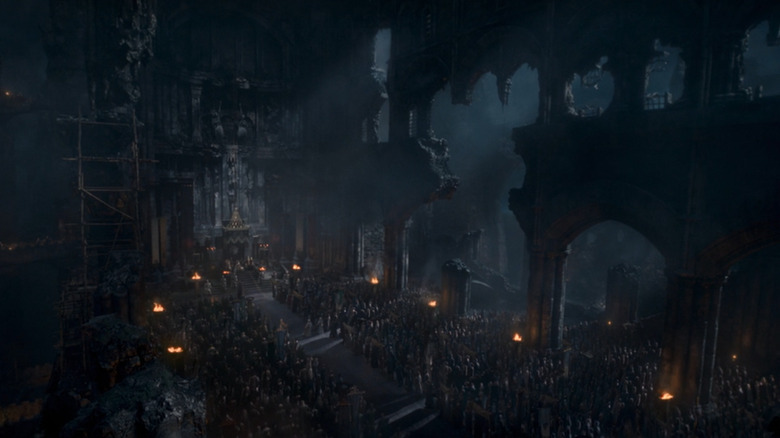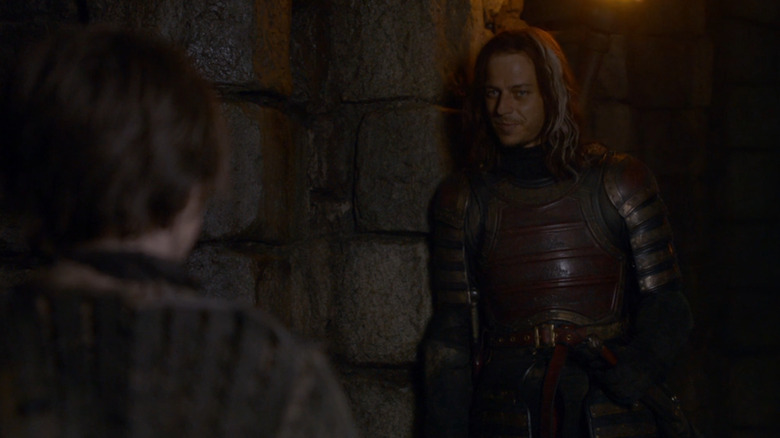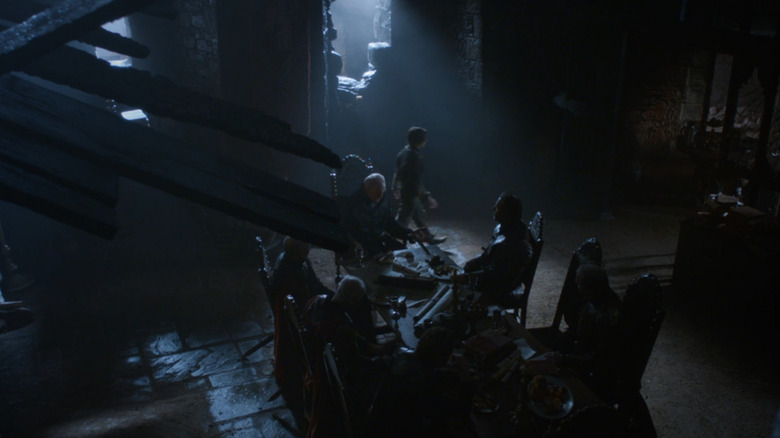An Important Curse From Game Of Thrones Returns To Plague House Of The Dragon In Episode 6
The inhabitants of Westeros can be a superstitious lot, but then again, that tends to happen when the world is filled with fire breathing dragons, legions of the undead, shape-changing assassins, and practitioners of blood and shadow magic. It truly is amazing that anybody gets any politicking done in "Game of Thrones" or its prequel "House of the Dragon," considering the sheer amount of supernatural forces that stalk the world. As such, both the highborn and common folk tend to have some reservations about old myths.
Since it seems that some Westerosi have an apprehensive nature, it makes sense that several curses and cursed locations would dot their collective minds and landscape. For example, guest rights is an important part of their mutual culture — just think of the story Bran Stark (Isaac Hempstead Wright) tells Jojen (Thomas Brodie-Sangster), Meera (Ellie Kendrick), and Hodor (Kristian Nairn) that involves a lord being transformed into a rat after killing his own guest. White Walkers also form the backbone of many a story, as well as giant ice spiders the size of wolves (which we have yet to see, but one can only hope).
However, it looks like there is a curse from "Game of Thrones" that now has come back into focus with "House of the Dragon," with yet another family succumbing and adding to its grim legend.
The castle of Harrenhal has long been considered cursed
One of the most prolific castles in all of Westeros is the infamous Harrenhal, though by the time fans get to see this famous location in "Game of Thrones," it is a blasted ruin that changes hands quite frequently. Now that Episode 6 of "House of the Dragon" has premiered, we have gotten a chance to see the massive castle long before the events of "Game of Thrones."
It seems though that Harrenhal is still somewhat of a ruin, which means that the castle was destroyed even before "House of the Dragon." The first moments of the very first episode also features a brief shot of its interior, and its greatest hall is used to host a vote on who would succeed King Jaehaerys Targaryen. This is the moment that sees King Viserys (Paddy Considine) ascend to the throne instead of his cousin, Princess Rhaenys Targaryen (Eve Best).
Harrenhal remains in possession of House Strong in "House of the Dragon." House Strong has some fairly close ties to House Targaryen, considering that Lord Lyonel Strong (Gavin Spokes) acts as Hand of the King. In addition, his son Harwin Strong (Ryan Corr) is Captain of the Guard and unofficial baby daddy for Rhaenyra Targaryen (Emma D'Arcy), and his other son Larys Strong (Matthew Needham) is an absolute cutthroat and a close ally of Alicent (Olivia Cooke). Speaking of Larys and Alicent, an offhand comment from Alicent causes Larys to engage in some good old fashioned "Game of Thrones" treachery, and this act adds to the morose history of Harrenhal.
The death of Lyonel and Harwin Strong add to the legend of Harrenhall
Lamenting that Rhaenyra is getting away with her dalliances while Viserys turns a blind-eye, Alicent complains to Larys that she misses her father Otto Hightower (Rhys Ifans) as Hand of the King, mainly because he was never afraid to express his opinion. Larys takes this to heart, and orders several criminals to assassinate both his father and brother. In order to make sure he gets away with this little scheme, he cuts the tongues from these criminals so that they may never speak of their deeds, or the person who ordered it.
Starting a fire in the dragon-blasted Harrenhal, the blaze claims many lives and adds yet another layer of charred stone to the imposing location. It is mentioned by Larys that the blood of the people who built Harrenhal was added to the mortar in arrogance and hubris, and that Harrenhal is a cursed place that places judgment on all of those who pass through its gate.
Of course, the cursed nature of Harrenhal is brought up several times in "Game of Thrones," which takes place long after "House of the Dragon," but what is the history of Harrenhal that led to such a fearsome reputation?
Harrenhal was built by conquerors and slavers
Although brought up on many occasions in "Game of Thrones," the history of Harrenhal is even darker then one might expect (per the Game of Thrones Wiki). The land that would later be utilized as the location of Harrenhal was originally captured by a contingent of Iron Born, which is just another name for raiders and reavers from Pike. As ruthless brigands and oppressors, the Iron Born brutalize the natives, and enslave them for the construction of Harrenhal. Although Harrenhal is named after King Harren Hoare, it was his grandfather that led these Iron Born, and in order to capitalize on this new holding, he orders the grand construction of a castle that would dwarf all others.
As noted by A Wiki of Ice and Fire, Harrenhal takes 40 years to complete, and it results in the deaths of many involved in its construction, as well as the destruction of weirwood trees that had stood for thousands of years, which may have helped inspire the cursed nature of the castle. The immensity of this castle should not be underestimated, and the gatehouse alone is just as big as Winterfell's Great Keep. As previously mentioned, Harrenhal was the chosen spot for the Great Council, and it was picked for its ability to comfortably house the thousands of nobles and their entourages in attendance. There are five towers featured prominently in Harrenhal, and these are called the Tower of Dread, Widow's Tower, Wailing Tower, Tower of Ghosts, and Kingspyre Tower. Not exactly the most welcoming of names, but these were the names that were given after the arrival of Aegon Targaryen.
Harrenhal was destroyed the day it was completed
Unfortunately for King Harren Hoare, upon the first day of Harrenhal's completion, Aegon Targaryen decided to fly his dragon to Harrenhal. On his arrival, Aegon and his dragon Belarion the Black Dread immolated Harrenhal, which wiped out Harren's entire family and his bloodline. In a credit to its construction, Harrenhal remained standing, but its once massive halls and towers were left in a nigh perpetual state of ruin and desolation. From that point on, Harrenhal has been a blasted place, and only certain sections of the castle are ever utilized by whoever currently lays claim. However, to have the biggest castle in Westeros, even if it is destroyed, is still an impressive holding, and one that quickly changes hands between noble houses, which tends to add to the supposed cursed nature of Harrenhal because nobody remains in control for long.
In "Game of Thrones," Harrenhal goes through several different owners, but even before the events of this show, the castle goes through many different rulers, and most meet a most unfortunate end. Per A Wiki of Ice and Fire, after the burning of Harrenhal, House Qoherys is given control, specifically Quenton Qoherys. Unfortunately, this House is wiped out during the rebellion of Harren the Red. The next family to control Harrenhal is House Harroway, but again, this family is wiped out by King Maegor I Targaryen. In a slightly less bloody end, House Towers is the next to lay claim on Harrenhal, but that bloodline is extinguished when Lord Towers dies without an heir.
Harrenhal is an important location that helped start the events of Robert's Rebellion
Besides the above examples, Harrenhal also sees House Lothston descend into madness and be wiped out by House Whent, who then lay claim. House Whent is notable because they are the ones who host the tournament that sees Jamie Lannister (Nikolaj Coster-Waldau) recruited to the Kingsguard, as well as Rhaegar Targaryen being named as the tournament's champion. This is an important event in the history of Westeros, because this is where Rhaegar meets Lyanna Stark, which kicks off Robert's Rebellion and the near annihilation of the Targaryen bloodline.
Of course this is the point in which most people were introduced to Harrenhal, which has earned somewhat of a legendary status in "Game of Thrones." Harrenhal passes through several owners over the course of "Game of Thrones," and all meet a similar fate to those that came before in some form or another. Janos Slynt (Dominic Carter) is the first person to be gifted Harrenhal in "Game of Thrones" as a reward for his betrayal of the Starks, though he is never given a chance to claim his new home when he is stripped of his titles and sent to The Wall. The Lannisters then lay claim to Harrenhal, and use it as an almost ersatz military base and prison. This is where Arya Stark (Maisie Williams) and Gendry (Joe Dempsie) are taken after being captured, and they only manage to escape through Arya's dealings with Jaqen H'ghar (Tom Wlaschiha).
Many characters in Game of Thrones have directly addressed the cursed nature of Harrenhall
After the Lannister forces are forced to move, Harrenhal is put under the command of Roose Bolton (Michael McElhatton) on behest of the Starks. However, the Boltons later abandon their holdings, and Lord Petyr Baelish (Aidan Gillen) is soon named Lord of Harrenhal, though much like Janos, he never fully lays claim to the castle. Considering how many times Harrenhal has shifted owners, and the often reoccurring end of those that make Harrenhal their home, it makes sense as to why this gigantic castle has earned a cursed reputation. Nobody ever holds Harrenhold for any significant amount of time.
As Tywin Lannister (Charles Dance) tells Janos, "You're a bold man to take Harrenhal for your seat. Such a grim place, and huge ... costly to maintain. And some say cursed as well." Petyr Baelish also said of Harrenhal, "Cavernous halls and ruined towers, ghosts and draughts, ruinous to heat, impossible to garrison ... and there's that small matter of a curse."
Even Jamie Lannister is apprehensive about Harrenhal, and once stated, "This castle has an ill repute, and one that's well deserved. It's said that Harren and his sons still walk the halls by night, afire. Those who look upon them burst into flame."
Needless to say, Harrenhal has a sordid and deadly history, and it seems as if the fear of such of place isn't entirely misplaced.
